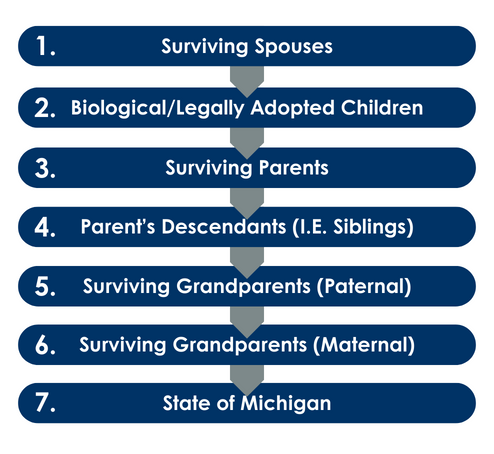Importance of Estate Planning in Michigan
Most Americans say they believe in the importance of Estate Planning, yet only 33% of U.S. Adults have actually executed estate planning documents. With such a large population of U.S. Adults not prepared for death, it begs the question; what happens if you die without a Will in Michigan?
If you die without a will in Michigan, you are considered to have died “intestate”. The relevant laws regarding intestacy will govern how your estate will be distributed.
Intestate Estate Distribution
- Your surviving spouse is the first to inherit. Under Michigan law, even if you disinherit your spouse by executing a valid will, your surviving spouse still has the option to “elect against the will” and instead ask for his or her “elective share”.
- The laws of intestacy then determine the amount to which your surviving spouse is entitled. This amount is based on your surviving spouse’s relationship to your surviving children.
- If you are not legally married at the time of your death, your estate is distributed to the following individuals in equal shares:
While this is an oversimplified depiction of intestate distribution, you can see how estate planning can be especially important for blended families or if you wish to leave an inheritance to a friend of yours or maybe a charity that has been important in your life.
Experienced Estate Planning Attorneys
Additionally, proactive estate planning allows families to bypass lengthy and expensive probate court proceedings and cut down on family drama that arises from estate disputes. Ultimately, estate planning will ensure you’re still able to care for the people/causes that matter most to you. Planning early can help you leave behind assets and resources that impact the world for generations to come.
If you have questions about your estate plan or starting one, contact Denise Medina at Fausone & Grysko, PLC. Contact Denise today at (248) 912-3220 or by email at DMedina@TheFGFirm.law.

